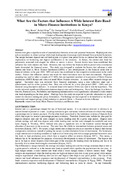| dc.contributor.author | Bosire, Mary | |
| dc.contributor.author | Mugo, Robert | |
| dc.contributor.author | Owuor, George | |
| dc.contributor.author | Oluoch, Wycliffe | |
| dc.contributor.author | Kakiya, Grace | |
| dc.date.accessioned | 2015-10-15T12:39:27Z | |
| dc.date.available | 2015-10-15T12:39:27Z | |
| dc.date.issued | 2014 | |
| dc.identifier.uri | http://karuspace.karu.ac.ke/handle/20.500.12092/1801 | |
| dc.description.abstract | Interest rates play a significant role of intermediation between savers and potential borrowers. High deposit rates acts as incentives to attract savings while high lending rates discourage credit demand from potential borrowers. The margin between deposit rate and lending rate at a given time period forms an interest rate band which has
implications on borrowing and deposit mobilization in the economy. In Kenya, the interest rate band has persistently remained wide despite the efforts to narrow it down. Several factors have been established that influence this wide interest rate band. However, this was before the financial reform period when commercial banks dominated the financial sector. This study was designed to evaluate the factors that influence a wide interest rate band in Micro Finance Institutions (MFIs) is new developments in the financial sector due to financial reforms in the year 2004. MFI sub sector has contributed to the competitive environment in the credit market. Factors that influence interest rate bands for these Institutions have not been documented. Purposive sampling was used to select a sample of 27 MFIs that are registered members of Association of Micro Finance Institutions (AMFI) Kenya and carry out retail Micro Finance activities. A cause effect research design was applied. Secondary data was extracted from financial statements using a data collection sheet and a questionnaire used to collect primary data. Data was collected for a four year period (2005 - 2008) and was analyzed using descriptive statistics. A censored linear tobit model (Tobit) was used to test the hypothesis. The results indicated significant differentials between deposit rates and lending rates. From the findings, four factors; Growth, Financial costs, Profitability and Operating/Administrative costs significantly influenced a wide interest rate band depending on the time period. Findings from this study are expected to provide information to policy makers for decision making and policy formulation. The findings are also expected to be beneficial to the Donor
community and support groups in their endeavor to promote Micro — Finance activities in Kenya | en_US |
| dc.language.iso | en | en_US |
| dc.publisher | Research Journal of Finance and Accounting | en_US |
| dc.subject | interest rate band, Micro Finance Institution, and Interest rates | en_US |
| dc.title | What Are the Factors that Influence A Wide Interest Rate Band in Micro-Finance Institutions in Kenya? | en_US |
| dc.type | Article | en_US |
